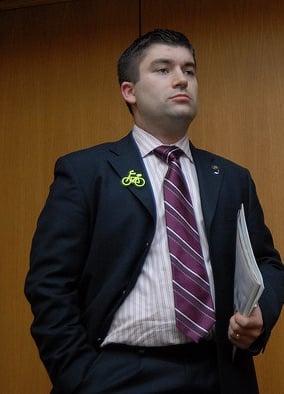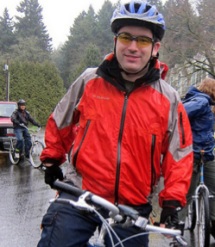
first became a state legislator in 2009.
(Photo © J. Maus/BikePortland)
Multnomah County Commissioner Jules Bailey has told the Willamette Week that he’ll enter the mayoral race.
This surprise announcement means current candidate Ted Wheeler won’t have the easy ride into City Hall many expected when Mayor Charlie Hales recently decided he wouldn’t run for re-election. Bailey, 36, has a significant political background from his stint as an Oregon state represenative and he’s very well-known among many Portland voters — especially voters who care about active transportation issues.
“…We can more effectively manage our transportation system by using transportation dollars not just for projects built for cars, but also for projects that reduce the need for cars.”
— Jules Bailey
In 2008 Bailey was endorsed by the Bike Walk Vote political action committee. Before he even got to Salem, he came out against the highly controversial Columbia River Crossing project as part of a coalition that wanted to stop it. Then, once Bailey got into office and the CRC project evolved into the defining political transportation issue of the past decade, he changed his mind.
Here’s a rundown of Bailey’s biking and transportation policy experience as culled from our archives…
Bailey voted in favor of the CRC project in February 2013 and it was a vote that upset and baffled many of his supporters. A week after his vote at an event hosted by the Oregon League of Conservation Voters, activists crashed the party and presented Bailey with a mock award. (Bailey ultimately explained his support of the CRC funding bill as a way to, “change the course of the project to make it more reflective of our long term transportation needs.”)
While Bailey is likely to find himself explaining that vote again during the upcoming mayoral race, he’ll also have a lot of other, more popular, policies to talk about.
One of the first things Bailey did when he joined the legislature was come out as the chief sponsor of the “Idaho Stop” bill. This very popular bill would have made it legal for bicycle operators to treat stop signs as yield signs. “This is about the economy, people’s health, and about the environment,” Bailey once said during a hearing for the bill in March 2009. “We’re not legalizing bad behavior, we’re decriminalizing good behavior.”
The Idaho Stop bill ultimately failed and Bailey placed much of the blame on a late-in-the-game staffing change made by the Bicycle Transportation Alliance.
Bailey’s next big transportation idea was to base traffic fines on vehicle weight. His idea was to create a new weight class for non-motorized vehicles weighing under 50 pounds (a.k.a. bicycles) and then have state and local law enforcement index their fine amounts accordingly. His reasoning? “It’s your basic physics equation,” he explained to me at the time. “Force equals mass times velocity, squared.” That bill ultimately failed due to what Bailey said was a legislative technicality. (He said he’d bring the idea back up but never did.)
On three separate occasions Bailey tried to increase funding for biking and walking. He first wanted to include more money for biking and walking in the 2009 Jobs and Transportation Act. That attempt failed, but Bailey still voted in favor of the JTA despite it being called “highway-heavy” by bicycle and environmental groups.
Advertisement
Bailey’s support of the JTA — which mandated ODOT to build nearly $1 billion in highway projects — was in some ways similar to his controversial support of the CRC funding bill. While each bill was scary to many of his progressive constituents, Bailey thought it better to go with the political mainstream and be a reformer from the inside rather than stake out an opposing position that might have ultimately left him with less negotiating power.
Here’s what I wrote after Bailey testified in support of the JTA in May 2009:
“I was clear that Bailey understands the perils of building too many highways. However, despite saying “We can’t simply build our way out of our transportation problems,” he threw whole-hearted support behind a bill that funds nearly $1 billion in new highway projects and gives relatively meager consideration to everything else.”
And Bailey wasn’t done trying to get more state funding for biking and walking projects. In the 2011 session he proposed a constitutional amendment that would have allowed gas taxes and other motor vehicle-related fees to be use for transportation projects that, “will prevent or reduce pollution and congestion created by use of motor vehicles.” That effort didn’t get very far.
Then in 2013 he was back at it again with a bill that would have made bike paths and other active transportation projects eligible for highway trust fund dollars. The bill, Bailey explained to me at the time, “Simply acknowledges that we can more effectively manage our transportation system by using transportation dollars not just for projects built for cars, but also for projects that reduce the need for cars.” It unfortunately didn’t pass.
In smaller battles, Bailey has proven himself a supporter of biking and common sense. Remember when House Representative Mitch Greenlick wanted to ban children under six from biking with adults? It was Jules Bailey who not only swooped in to clean up the mess, but made some political hay about it by showing up in the rain to join families on a Kidical Mass ride that same week.
More recently as a Multnomah County Commissioner, Bailey once again came to the aid of bicycle riders in our region when he struck language from the county’s Sauvie Island/Multnomah Channel Plan that would have made an unecessary and potentially harmful reference to “recreational bicycle activities.”
On a personal note, Bailey currently lives in the Multnomah Village neighborhood in southwest Portland and he’s a brand new dad.
Bailey’s entry into the mayoral race (which he’s not going to officially announce until January) is just what Portland needs. We look forward to covering it. For now, check out JulesBailey.com to learn more about him.
— Jonathan Maus, (503) 706-8804 – jonathan@bikeportland.org



